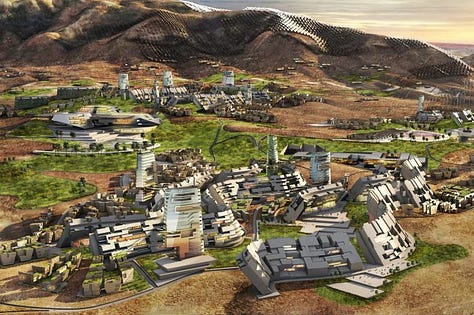5th Generation
There’s a lot of digital noise out there regarding the well-worn bugbears of 5G and WEF climate agendas. Partly this is the elites’ doing—it’s in their interest to create a dissonance by magnifying adherents of the most outlandish of the theories while shunting the others into becoming social pariahs.
In fact, these days even so much as saying the words ‘5G’, or ‘WEF’, or ‘Climate Agenda’, evokes a kind of inner wince for people even on the ‘dissident-thought’ spectrum, who’ve been simply knackered into a sort of revulsion of the more fringe of these concepts due to the caricaturized tint they’ve taken on the internet.
Unfortunately, such a breathless array of conspiracy-theorycrafting has gone on about these concepts as to turn them into figleaves for the true sinister agendas lying just beneath the surface.
In the case of 5G, the wilder of the theories range in everything from graphite RFID mind-control to a Coronavirus activation frequency. And while—being a proud, dyed-in-the-wool ‘conspiracy theorist’ myself—I don’t discriminate against the more lunatic-fringe-inclined of our constituency, I do believe that the noise they generate inadvertently provides convenient cover for the real agendas at play.
There’s been a bevy of articles over the years from esteemed writers as Alistair Cooke, Brandon Smith, Charles Hugh Smith, and others about these topics—such that it’s taken on a sort of woo-woo fear-mongering tint to many people. But most have missed the mark specifically when it comes to the true intentions behind the heavy-handed 5G rollout, and its placement at the crown of the elite’s pyramid of agendas. And although there is the possibility of a covert set of secondary and tertiary objectives, they would fall under very narrowly focused pilot programs, overseen by small ‘groups within groups’ which would not be related to the main thrust of the program at large.
So, what is this actual main thrust behind the globalist 5G push you’re wondering?
Geo-Fencing
When most think of 5G, what first comes to mind are things like: faster internet speeds, lower latency, and ubiquitous HD/4k video streaming. Sure, these are all welcome trojan horses to lower our guards, but the true heart of the matter begins with the premise of geofencing. What’s that you say? Geofencing is a way to track and demarcate a given geographical area, by establishing a digital ‘boundary’. In a way, your cellphone is already doing this when it enters the ‘zones’ of a particular cell-phone mast/tower.
But the problem is, previous iterations of data technology, like 4G, all lack the spatial acuity for extremely precise positioning accuracy. Ever notice how your iPhone’s tracking feature, like ‘Find My iPhone’, can give a rough estimate of the position that’s always within a vaguely wide area spanning many meters?
4G LTE has an accuracy measured in dozens of meters, while 5G can be in centimeters due to the narrowness of its beam, the very same which stands to damage human DNA, trigger potential cancers, etc.
AT&T CEO Randall Stephenson describes it here at the 23:00 mark:
It’s particularly enlightening hearing it from him because AT&T is the world-leader in 5G integration. The company’s name to many people conjures images of a middling cell-phone service, but infact AT&T is now a global conglomerate which owns or has owned some of the most powerful brands that include TimeWarner, CNN, etc. This makes it one of the most influential corporations in terms of controlling societal content and general experience of our daily lives.
So, what does 5G’s extreme ability to geofence allow them to do?
Primarily: 5G’s highly granular geofencing acuity provides the base and underlying infrastructure, the foundation, for the future ‘smart city’ they plan to convert our societies into. It allows sensors deployed all over to have highly accurate, pinpoint tracking capabilities of all other sensors in their vicinity, at extremely low latencies. This enables the distribution of AI and robotics systems and services throughout a given city to become integrated like never before, as every ‘machine’ will be networked in ways which give them extreme precision in geolocation ‘awareness’ of each other spatially, compared with current 4G capabilities. There are a few subsidiary concepts related to this, such as the Internet of Things.
But more importantly, the true ‘dark side’ of what geofencing allows, is the creation of precisely delineated ‘zones’, which enable the tracking of a person’s movements to a finely granular resolution (within centimeters); and if need be (and of course, there will be such ‘needs’ engineered) to prevent their access from ‘off limit zones’.
It’s understandable that a lot of this may initially sound like techno-babble. But that’s just the ground work; a few examples will illuminate the real inherent dangers.
By far the most immediately pressing of the applications is for Covid-ID and QR-Code compliance. A 5G networked city can create geo-barriers which would identify your device’s compliance, or lack thereof, from a distance and with far more precision. It can be something as simple as store entrances which will automatically scan your device (phone, wrist bracelet, RFID chip, etc.) and alert a ‘violation’ then block you from entry. Though Covid might be passé and many of the totalitarian initiatives it birthed were stillborn, but TPTB have certainly telegraphed their plans for further ‘outbreaks’ down the line—this isn’t the last that we’ve heard of pushes for Vax-Passes.
This further extends to general sectors of a given city, which can be entirely ‘digitally-cordoned’ off by way of these precise geofences. This plays into the WEF’s agenda to push for not only ‘smart cities’ in general, but their specific vision of ‘15 Minute Cities’, which they’ve already been trial-running in many places. These 15 Minute Cities are just the precursor, a sort of soft roll-out, of the complete plan of total societal redesign envisioned in the old Agenda 21, and later revised Agenda 2030 blueprint.
Their ‘Young Global Leader’ luminaries are of course first in line to push these initiatives onto their citizens. Canada’s Trudeau being foremost amongst them:
From the article linked above:
“And basically told them that we would not be able to get funding for our healthcare unless the premiers agree to the digital IDs…You will not be able to access any healthcare without these digital IDs. You will actually not be able to carry a bank account or do anything online regarding financial transactions…For farmers and consumers, you will not be able to get into stores. You will not be able to even sell anywhere. Once they have this system in place, this is where the digital currency will come in.”
Naturally, the initiatives are presented under the guise of combating the so-called ‘climate crisis’. For years now, many larger municipal authorities like NYC have brain-stormed plans to create different versions of these ‘15 Minute City’-inspired zones, with the purpose of restricting individual travel and freedom under the pretext of reducing carbon expenditures.
But where it gets truly dark vis a vis the 5G integration, is when we begin descending down the rabbit-hole of the ‘personal carbon credits’. This WEF brainchild is intended to eventually be fused with the overall ‘smart city’ schema. Using climate change as cover, the carbon credit allotment is designed to track our personal carbon usages with an inbuilt punitive system which will penalize us for going over the carbon allotment.

This could be something as simple as using too much water, too much heat or fuel, traveling outside your designated ‘15 minute zone’ without a permit as described in this video, not donating a given portion of your funds toward some contrived ‘climate action’ initiative, etc. What 5G allows, is the complete surveillance and more importantly enforcement of these efforts. Without 5G, they cannot track each and every one of these things, particularly your spatial movements, with the granularity and resolution necessary for large scale enforcement.
5G also allows the ‘antennas’ and sensors to be much smaller yet more widespread, since they utilize shorter wavelengths, which means—as the AT&T CEO explained in the above video—they will be ubiquitously distributed everywhere to a far greater density than the cell-phone masts and towers that now dot the landscape.
End Goals
If the so-called ‘climate crisis’ is a bogus red-herring, what’s really behind these efforts to impose such totalitarian control over our lives? The answer lies in the simple fact that the global financial system has been in slow collapse for a long time, and this is their only way out of an intractable dead-end. The climate agenda, first envisioned at the Earth Summit in Rio de Janeiro in 1992, was from the get-go designed as a way to implement ever-increasing control over the financial stability of ‘The System’—otherwise, if people are allowed to operate freely, the global debt bubble spawned since the end of WW2 and the Bretton Woods era will eventually implode the precariously over-leveraged and flimsily-held-together world banking system.
The peskiest thing to the bankers is when the herd doesn’t quite use their money in the way which best serves the system—this endlessly convoluted monstrosity they created. For the fiat system to continue to function as it screeches down the rails on its locked wheels, they need the villeins to keep the money circulating as much as possible. In a concept sometimes called financial velocity, stagnant money is a major gum-up in the gear-works of the global financial system. Unfortunately, in downturns people tend to save and hoard their cash, which creates mega-problems for the System Controllers.
This is the chief reason behind plans to roll out CBDC’s (Central Bank Digital Currencies), and slowly obsolete the use of cash. With CBDC’s they can control when and how you use your funds. Coupled with the eventual ‘personal carbon credit’ system, it creates the perfect fusion of technologies by which they can not only make sure you continue spending your money, but penalize you automatically for violating the ever-tightening carbon allotment rules.
Listen to the General Manager of the BIS (Bank For International Settlements) explain it himself:
“The key difference with the CBDC, the Central Bank will have absolute control of the rules and regulations that will determine the use of that expression of Central Bank liability, and also we will have the technology to enforce that…and that makes a huge difference in respect to what cash is.”
What he’s articulating is that, they will determine how you can use the digital currency, what specific parameters, conditions, etc. It’s no different than how the government has long had conditions attached to the use of welfare/food-stamps, like only being allowed to purchase special ‘government cheese’ rather than the name brand.
There are already plans in discussion by central bankers for having digital currencies with ‘timers’ or expiration dates set on them, which would allow you to only use those funds within a given timespan. Certainly, such impositions won’t be initially attached to all digital currencies; perhaps only in special cases, like when the government ‘graciously’ grants you some stimulus, like Biden’s infamous Covid aid package, which will have such ‘strings attached’.
A December 2021 abstract from the Bank of Canada already shows they’re conceptualizing such currencies:
An inconvenient aspect of physical cash is that it can be lost, and there is no way to recover it. We consider a potential feature to solve this problem for offline digital cash: an expiry date to automate personal loss recovery. With this feature enabled, digital cash could not be spent after its expiry date. Consumers whose digital cash expired would automatically receive the funds back into their online account without having to file a claim.
Of course, they initially clothe it in an ‘innocuous’ pretext to keep the true intentions, triggered later under some manufactured ‘crisis’ no doubt, from being gleaned.
However, as society progresses into the next decade, much of the autonomization predicted to take place with the coming AI replacements of many strata of job fields will cause large segments of society to be perma-enrolled into UBI’s—another one of the key cornerstones of the WEF plan.
UBI (Universal Basic Income) trials are already being rolled out in many states and nations, from California to Spain, Germany, Finland, Hong Kong, Scotland, and others. These UBI’s are, of course, planned to be administered with the poison pill of digital currencies, underlaid by the foundation of 5G—which will pull it all together into one tight and ubiquitous system.
Receiving your UBI will be contingent upon a host of ‘conditions’, such as being up to date in your vax compliance, your carbon credit allotment, and whatever else they choose to impose upon you.
By now we’ve all likely seen the infamous video of Pfizer CEO Albert Bourla discussing the ‘digital pill’ which will enable the enforcement of ‘compliance’, so that—in his example—doctors can definitively know patients are taking their prescribed medicines. 5G will be the key component of managing the integration between your ‘digi-medicines’ and ‘compliance-devices’ networked into the ‘Internet of Things’.
Of course, extrapolated out, such ‘compliance’ enforcement will apply to many other avenues of life and society, once the 5G infrastructure gives it the bandwidth to accurately track this data.
Here too, geofencing will play a key role in ‘penalizing’ you for non-compliance by keeping you locked out of sectors and segments of society. For instance, zones for ‘compliance-positive’ people will have the good shopping stores with the ‘healthy’ food, while ‘compliance-negative’ people will be sequestered into seedy bustees like Seattle’s CHAZ zone, where all the main retailers have long abandoned ship due to the uncontrolled crime waves.
Some might consider 5G discussions as a bit outmoded. After all, it’s been years of recursive specter-building without much of the spooky consequences yet palpable around us. But as a Council on Foreign Relations 5g video stated only a couple years ago, ‘it will be years before 5G’s potential is fully realized.’
A similar WEF video sums it up succinctly as: “4G was about connecting people, 5G is about connecting devices.” This really gets to the heart of the matter and foreshadows the importance that AI will play in the coming ‘5G revolution’. Now that society has recently gotten a taste of the new AI systems Big Tech has been brewing up in the last few years, we can only imagine the ways that they will play an integrative role within the new ‘Internet of Things’ devices expected to dominate the future ‘smart cities’ we’re bound for.
Age of the Neo Free Cities
What does the future hold, one wonders? Many of the largest Big Tech players are scrambling to construct their own private visions of Utopia, Babylonian neo-cities, built from the ground up with the most radical of the tech-utopia premises in mind.
It was something predicted long ago to happen. The tech giants can read the wind as to society’s trajectory. The most ambitious and forward thinking (read: Machiavellian) of them have likely forecasted the decline of local governance towards eventual dissolution, leaving a power vacuum for corporations—acting as municipal custodians—to lead the way into the future by rebuilding society in their own vision (while lording over it).

Two years ago, Nevada’s governor rolled out a plan for dystopic ‘Innovation Zones’:
Nevada Governor Steve Sisolak is trying to lure high-tech firms into his state with an offer to allow them to effectively form independent governments at county level, capable of levying taxes and even forming courts.
The unsettling idea would even allow them to hold judicial power, in stark echo of the once leading globalist Trans-Pacific Partnership plan, which would have effectively negated states’ sovereignties by allowing multi-national corporations to arbitrate their own ‘laws’ in supersession of a given state’s national laws and codes.
That’s not an exaggeration, either – companies that pull up stakes and move to Nevada will be able to form their own local governments with the equivalent authority of a county. They will be able to levy taxes, form courts and school districts, provide government services, and essentially act as sovereign entities.
“The Board may establish a justice court,” the legislation draft obtained by LVRJ stipulates. In addition, with a few exceptions for real estate, fuel and tangible personal property, “the Board may impose any taxes or fees authorized to be imposed by a county.”
Some corporations have already gleefully jumped at the idea:
Blockchains LLC, located in Sparks, is one company planning to take advantage of the package and has reportedly committed to building a “smart city” east of Reno. Other blockchain companies, autonomous technology and AI, internet of things, robotics, wireless, biometrics and renewable energy are some of the industries for which Sisolak is rolling out the welcome mat.
As stated above, the welcome mat is being specifically rolled out to companies championing all the key buzzwords of the WEF utopian ‘smart city’. The obvious rationale being that these initial pilot projects are meant to serve as demonstrator models to later influence policy. Simply put: they plan to show how ‘successful’ such smart cities can be, which will then be used to coercively push and lobby these very same ‘innovations’ onto every other city.
A radical experiment is being considered in the U.S. state of Nevada. It would allow new local governments to be formed on land owned by tech firms. Jeffrey Berns, the cryptocurrency millionaire who proposed the idea, is convinced of its revolutionary potential. The challenge now is changing the minds of sceptics who are not. For some, one man's utopia is their dystopia.



On the heels of those initiatives, Elon Musk, too, announced plans to build his own such city in Texas, called Starbase.
As mentioned earlier, in the event that societal collapse ever occurs, these ‘corporate self-governance’ centers will flourish as the new centers of power disconnected from any functional ‘central government’. The parent corps will own all of the attendant land, infrastructure, equipment, local laws and civic structures etc., so it would be only natural for them to exert full dominion as the power of central government wanes in a slow societal deterioration scenario. After all, many technocrats have long predicted that some sort of black swan ‘shock’ would be necessary to ‘reset’ society to their vision:

Though some of the Covid era’s most repressive intrusions seemed to have been fended off for now, the technocrat designers are busy reassembling their forces and reformulating their approaches. Ironically, the Covid era created a major hitch in the 5G rollout plans. Many countries cancelled or postponed their 5G spectrum auctions where telecom operators purchase licenses for the various bands to be used.
However, it was likely only a temporary hindrance as global adoption is still ‘projected’ to explode exponentially in the coming years:
The current geopolitical turmoil and global recession, too, have put the brakes on many of these rollout plans. The snarled supply chains caused by both the economic downturns and U.S.’s weaponization of trade to curtail China’s rise in particular have led to global chip shortages and electronics price increases, which have all profoundly affected the plans to saturate the world with cheap 5G-connected gewgaws and devices to create their idyllic ‘Internet of Things’.
The U.S. has both attacked and sanctioned Huawei—the leading 5G implementor—as well as China’s ability to purchase various high-tech products abroad, which has likewise led to instabilities in the tech sector compounding supply chain issues.
It’s a wry bit of irony then, that the technocrat elites’ golden idée fixe could be confounded by the superceding demands of a dying global empire hellbent on clinging to its last few chips.
For us little folks, it’s a kind of rock and hard place scenario. But one supposes there’s a silver lining in the globe’s potential descent into an economic and geopolitical dark age, which could paradoxically hold at bay some of the more ill-meaning of the technological transformations the System Controllers had in store for us.
The great global disentanglement and economic detachment could after all spur the death of globalism itself, which would have a profound cascading effect on the technocratic, multinational corporations steering us into this technologically perverse and uncertain future. We could in fact end up in an age we’ve never imagined: one marked by an endless economic malaise and technological stagnation on the one hand, but a resurgence of nationalist sovereignty brought on by geopolitical strife on the other. This could create a unique set of circumstances by which the virus of techno-corporate-fascism could be suffocated into obscurity like a smothered flame.
One supposes it’s like blood-letting or chemo-therapy, we may have to singe ourselves to burn out the canker; but a scab’s better than a shackle.












Santa Clara county used geofencing to monitor how many people were inside a church that did not follow the Covid mandates
They like Corporate cities and entities - e.g. London, East India Company, Vatican City et al. Governance by the people for the people is so 'Enlightenment' period! Maybe the rise of the West, fuelled by private ownership rights, was a mere aberration in the historical timeline, andn ow we are reverting to normal?